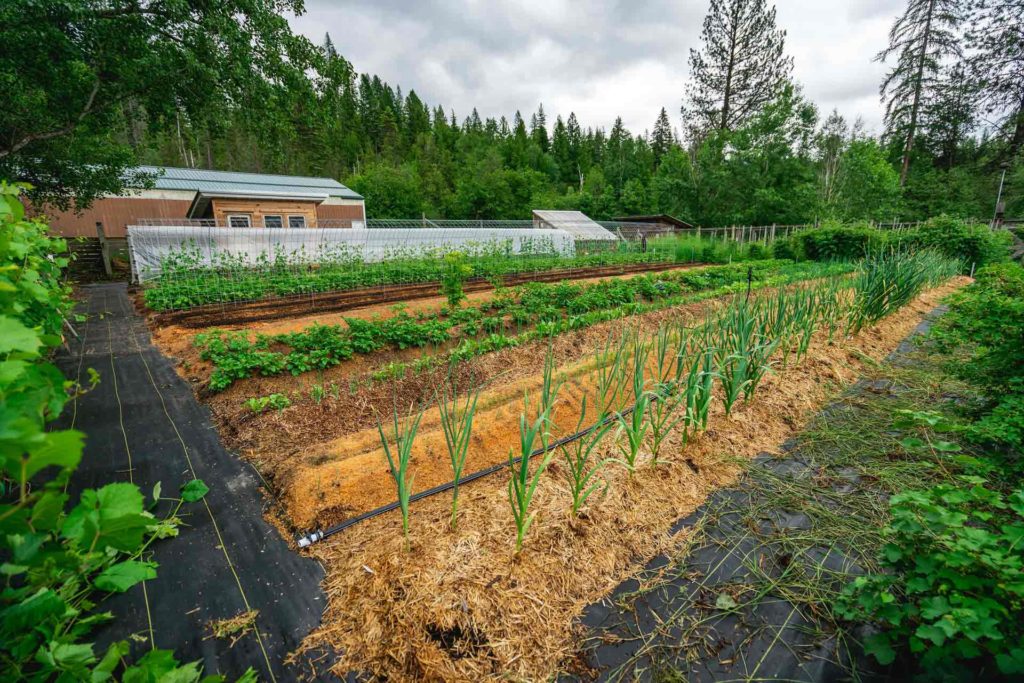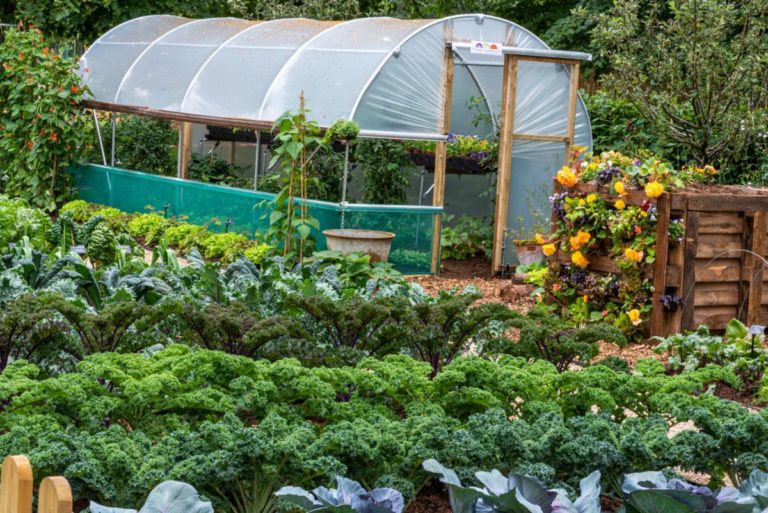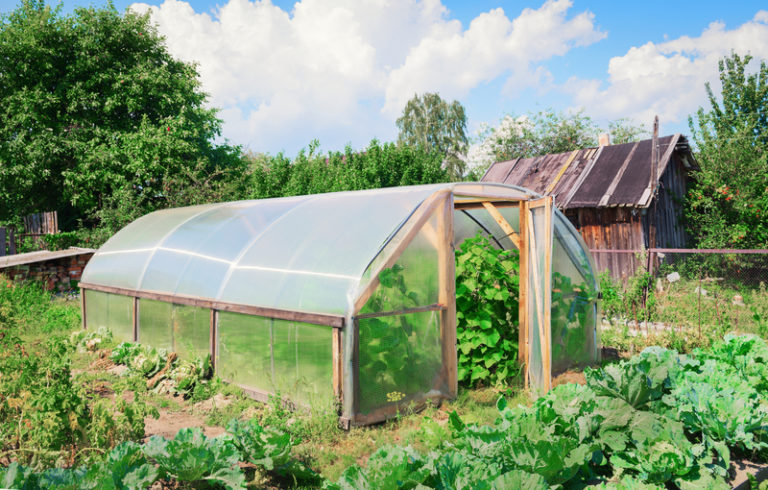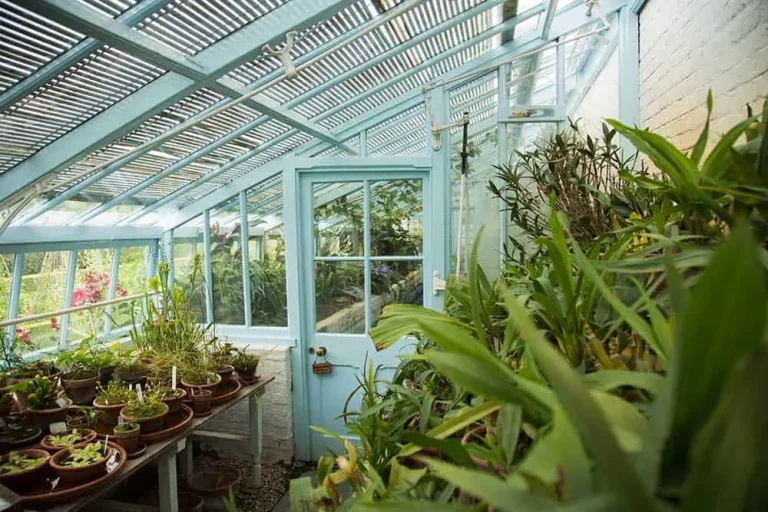By embracing sustainable practices and harnessing technology, you can produce a bounty of fresh, healthy crops on your homestead.
We’ll explore some of the most creative and effective methods for producing your own food in an off-grid setting.
From vertical farming to aquaponics, we’ll delve into the latest trends and techniques that will help you thrive as a self-sufficient homesteader.
Whether you have limited space or resources, these innovative solutions can help you achieve your dream of living off the grid and producing your own food.
So let’s dive in and explore the future of off-grid homesteading!
Rainwater Harvesting
Collect and store rainwater in tanks or cisterns to use for irrigation, livestock watering, and household use. This can greatly reduce your reliance on city water and save money on your water bill.
By investing in a rainwater harvesting system, homeowners can collect and store rainwater in tanks or cisterns for use in irrigation, livestock watering, and even household use.
This can significantly reduce reliance on city water, leading to not only cost savings on water bills, but also a more sustainable and self-sufficient lifestyle.
To implement rainwater harvesting, homeowners can begin by installing a rainwater collection system, such as a roof catchment or a ground-based collection system.
These systems can be connected to a storage tank or cistern, which can be made of materials such as plastic, steel, or concrete.
It is important to ensure that the storage tank is properly maintained and cleaned to prevent contamination and bacterial growth.
In addition to reducing water bills, rainwater harvesting can also provide numerous other benefits for off grid living and homesteading.
For example, it can reduce the strain on local water resources, decrease the amount of stormwater runoff, and provide a reliable source of water for irrigation and livestock watering.
Furthermore, by using rainwater collection, homeowners can reduce their reliance on city water and become more self-sufficient, which can lead to a more sustainable and eco-friendly lifestyle.
Overall, rainwater harvesting is a valuable technique for off grid living and homesteading, providing numerous benefits and opportunities for sustainability and self-sufficiency.
Composting Toilets
Use composting toilets to turn human waste into fertilizer, which can be used to grow nutrient-rich crops. These toilets use minimal water and can be self-sustaining, making them an excellent choice for off-grid homesteads.
Composting toilets offer an innovative solution for managing human waste in an off-grid homestead.
These toilets use natural processes to decompose human waste, producing a rich fertilizer that can be used to grow nutrient-rich crops.
Unlike traditional flush toilets, composting toilets require minimal water, making them an excellent choice for those looking to reduce their water usage and reliance on public utilities.
Composting toilets can be self-sustaining, meaning that they can operate independently of any public sewage system.
This makes them ideal for off-grid homesteads where access to water and sewage services may be limited.
In addition to their water-saving benefits, composting toilets also provide a number of other advantages.
For one, they can greatly reduce the amount of waste that is sent to landfills, where it can contribute to greenhouse gas emissions and pollution.
Furthermore, the compost produced by these toilets can be used to improve soil health, reducing the need for synthetic fertilizers and pesticides.
And, by using human waste as a source of fertilizer, composting toilets can help to close the nutrient cycle and create a more sustainable and self-sufficient off-grid homestead.
Overall, composting toilets offer a unique and innovative solution for managing human waste in an off-grid homestead.
By using minimal water and producing a valuable fertilizer, these toilets can help to create a more sustainable and self-sufficient off-grid lifestyle.
They also offer a number of environmental benefits, including reduced greenhouse gas emissions and improved soil health.
By using minimal water and turning human waste into a valuable fertilizer, these toilets offer a unique and innovative solution for managing waste in an off-grid setting.
In addition to their water-saving benefits, composting toilets also provide a number of other advantages.
For one, they can greatly reduce the amount of waste that is sent to landfills, where it can contribute to greenhouse gas emissions and pollution.
Instead, the waste is turned into a valuable resource that can be used to improve soil health and fertility.
This can be especially important for off-grid homesteads, where the soil may be poor or depleted.
Furthermore, composting toilets are a great option for off-grid living and homesteading because they are relatively low-maintenance and easy to use.
They do not require a connection to a sewage system, and they can be installed in a variety of locations, including remote or mountainous areas.
This makes them a versatile and practical solution for off-grid households who want to reduce their reliance on traditional sewage systems and create a more sustainable and self-sufficient lifestyle.
Overall, composting toilets are an excellent option for any off-grid homestead looking to reduce their impact on the environment and create a more sustainable future.
Container Gardening
Use containers to grow a variety of fruits, vegetables, and herbs. This can be especially useful for those with limited land or soil. Container gardening allows you to grow crops in small spaces and can also be used to extend the growing season.
Container gardening is a versatile and space-saving way to grow a variety of crops, especially for those with limited land or soil.
By using containers, you can grow a wide range of fruits, vegetables, and herbs in small spaces, such as balconies, rooftops, or even indoors.
This method is especially useful for extending the growing season, as containers can be moved to a protected location during harsh weather conditions, such as extreme temperatures or heavy winds.
Furthermore, containers can be easily relocated as needed, providing the flexibility to experiment with different garden layouts and arrangements.
With container gardening, off grid living and homesteading enthusiasts can enjoy fresh, locally grown produce all year round, regardless of their geographical location or available land space.
Greenhouses
Build a greenhouse to grow crops year-round and extend the growing season. Greenhouses can be used to grow a wide variety of crops, including tomatoes, peppers, and cucumbers. They can also be used to start seedlings and get a head start on the growing season.
Greenhouses are an invaluable asset for off-grid living and homesteading, allowing you to grow a wide variety of crops year-round and extend the growing season.
By building a greenhouse, you can start seedlings and get a head start on the growing season, allowing you to enjoy fresh, nutritious produce even in the coldest of winters.
Greenhouses can be used to grow a wide variety of crops, including tomatoes, peppers, cucumbers, and leafy greens, all of which can be harvested throughout the winter months.
This not only provides a consistent source of fresh produce, but also reduces the need for stored food, freeing up space in your pantry and reducing your reliance on grocery stores.
In addition to growing crops, greenhouses can also be used for other purposes, such as preserving food through canning and dehydrating, or even for raising animals.
By investing in a greenhouse, you can create a self-sufficient and sustainable homestead that provides all the necessities for a fulfilling and healthy life off the grid.
Whether you’re just starting out or looking to expand your existing off-grid lifestyle, a greenhouse is an essential component for achieving true self-sufficiency and maximizing your homesteading potential.
Worm Composting
Use worm composting to turn food scraps into nutrient-rich soil. Worm composting can be done indoors or outdoors and can produce a high-quality compost that is perfect for growing crops.
Worm composting, also known as vermicomposting, is a highly efficient and sustainable way to transform food scraps into a nutrient-rich soil amendment.
By leveraging the natural processes of earthworms, you can create a high-quality compost that is perfect for growing a wide variety of crops.
To get started with worm composting, you will need a worm bin or container, some red wiggler worms, and some food scraps.
The worms will eat the food scraps and convert them into nutrient-rich compost, which can be harvested and used to fertilize your crops.
The best part about worm composting is that it can be done indoors or outdoors, and it is an excellent way to reduce your waste and create a more sustainable and self-sufficient lifestyle.
First, it is important to maintain the proper moisture level in the bin, as worms need a consistently moist environment to thrive.
You should also avoid adding meat, dairy, or oily food scraps to the bin, as these can attract pests and create unpleasant odors.
Instead, focus on adding vegetable scraps, fruit peels, and other plant-based materials.
By incorporating worm composting into your off-grid living and homesteading strategy, you can create a closed-loop system that minimizes waste and maximizes the potential of your land.
Whether you have a small balcony or a large plot of land, worm composting is an excellent way to turn your food scraps into a valuable resource for your garden.>
Worm composting, also known as vermicomposting, is a sustainable and innovative solution for turning food scraps into nutrient-rich soil.
By leveraging the natural processes of worm digestion, you can create a closed-loop system that reduces waste, minimizes environmental impact, and enhances the fertility of your soil.
Off-grid living and homesteading enthusiasts can particularly benefit from worm composting, as it allows them to repurpose their food scraps and create a more self-sufficient lifestyle.
Incorporating worm composting into your off-grid strategy can help you reduce your waste output, cut down on transportation needs, and optimize the use of your land.
To set up a successful worm composting system, it’s essential to maintain the right moisture level in the bin, provide adequate aeration, and ensure proper temperature control.
Start by selecting a well-ventilated bin and adding a layer of moist bedding material like shredded newspaper or coconut coir.
Add your food scraps and worms, and maintain consistent temperatures between 55-77°F (13-25°C).
As the worms break down the organic matter, they will produce a nutrient-rich compost that can be applied directly to your garden or potted plants.
Hydroponics
Use hydroponics to grow crops without soil. This method involves feeding nutrients to plants through a solution rather than through soil. Hydroponics can be used to grow a wide variety of crops, including leafy greens, herbs, and even some fruiting plants.
Off-grid living and homesteading are becoming increasingly popular as more people seek sustainable and self-sufficient ways of living.
One technology that can support this lifestyle is hydroponics, a method of growing crops without soil.
In a hydroponic system, plants are fed nutrients through a solution rather than through soil.
This allows for a more controlled and efficient growing environment, resulting in faster growth and higher yields.
Hydroponics can be used to grow a wide variety of crops, including leafy greens like kale and spinach, herbs like basil and cilantro, and even some fruiting plants like tomatoes and cucumbers.
This makes it an ideal system for small-scale, off-grid agriculture.
By growing crops without soil, hydroponics also eliminates the need for tilling, planting, and weeding, greatly reducing the physical labor required to maintain a garden.
Moreover, hydroponics can be tailored to meet the specific needs of each plant.
For example, the nutrient solution can be adjusted to provide exactly the right amount of each nutrient for optimal growth.
Hydroponics can be used to grow crops year-round, regardless of season or weather conditions.
This makes it an excellent option for off-grid living and homesteading, where access to traditional gardening resources may be limited.
Hydroponics offers a unique and highly efficient way to grow crops without soil, making it an excellent choice for off-grid living and homesteading.
Hydroponics is an innovative and highly efficient method of growing crops without soil, offering numerous benefits for those living off the grid or practicing homesteading.
By feeding nutrients to plants through a solution rather than through soil, hydroponics eliminates the need for tilling, planting, and weeding, significantly reducing the physical labor required to maintain a garden.
Hydroponics can be tailored to meet the specific needs of each plant, allowing for precise control over the nutrient levels and optimal growth.
This method also offers the potential for year-round production, regardless of season or weather conditions, making it an ideal choice for those living in areas with limited access to traditional gardening resources.
Moreover, hydroponics allows for the growth of a wide variety of crops, including leafy greens, fruits, and even flowers.
This makes it an excellent option for small-scale, self-sufficient living, as well as for larger-scale commercial farming.
And, since hydroponics can be easily integrated into existing homes and buildings, it offers a versatile and efficient solution for growing crops, regardless of the available space or resources.
Overall, hydroponics is an exciting and promising technology that offers a wide range of benefits for those looking to live off the grid and embrace a more sustainable, self-sufficient lifestyle.
Chicken Tractors
Use chicken tractors to grow crops and raise chickens at the same time. Chicken tractors are moveable structures that allow chickens to roam and eat insects and weeds while also providing a fertilizer for the crops.
Off grid living and homesteading often require innovative and resourceful solutions to meet one’s needs without relying on public utilities or commercial products.
One such solution is the use of chicken tractors, which allow individuals to grow crops and raise chickens at the same time while also improving soil fertility.
Chicken tractors are moveable structures that can be easily relocated around the homestead, providing chickens with access to fresh air, sunlight, and a diverse diet of insects, weeds, and crops.
As the chickens roam and forage, they fertilize the soil, provide pest control, and contribute to the overall health and productivity of the homestead.
This mutually beneficial system is an excellent example of off grid living and homesteading in action, promoting sustainability, self-sufficiency, and the use of local resources to meet one’s needs.
Fermentation
Use fermentation to preserve food and create nutrient-rich soil. Fermentation can be used to make sauerkraut, kimchi, and other fermented foods, as well as to create a nutrient-rich fertilizer for crops.
Fermentation is an essential aspect of off-grid living and homesteading, as it provides a means to preserve food and create nutrient-rich soil.
By using fermentation, you can turn ordinary vegetables like cabbage and radishes into delicious and nutritious foods like sauerkraut and kimchi.
These fermented foods not only provide a healthy source of sustenance, but they also contain beneficial probiotics that support digestive health and immune function.
The fermentation process can be used to create a nutrient-rich fertilizer for your crops.
By fermenting organic matter like kitchen scraps and manure, you can create a natural fertilizer that will promote healthy plant growth and improve soil fertility.
Off-grid living and homesteading rely heavily on self-sufficiency and sustainability, and fermentation is a valuable tool for achieving these goals.
Want More? Dive Deeper Here!
Hey there! If you’re the type who loves going down the rabbit hole of information (like we do), you’re in the right spot. We’ve pulled together some cool reads and resources that dive a bit deeper into the stuff we chat about on our site. Whether you’re just killing time or super into the topic, these picks might just be what you’re looking for. Happy reading!






